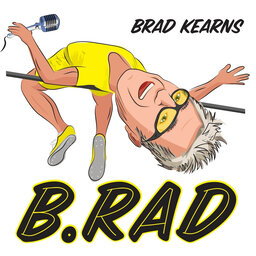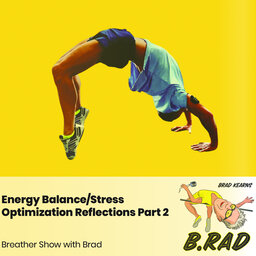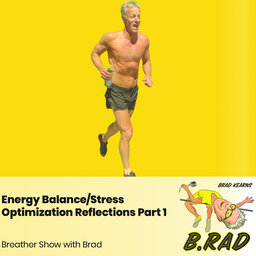Overtraining, Part 2: Symptoms Of Overreaching and Burnout (Breather Episode with Brad)
In part two of this three-part presentation on all aspects of overtraining, I present a strategy to recover from overtraining and how to avoid it in the first place by making intuitive evaluations of your present condition and behavior patterns and taking corrective action.
You’ll hear about an assortment of symptoms to identify the tenuous state of overreaching, and an assortment of symptoms indicating a state of overtraining/burnout. We talk about the importance of tracking your HRV score (check out my app for tracking your HRV here) and what dysregulated energy levels and having more energy in the evening really means, as well as what the presence of skin problems, certain hyper behavior (like tapping your feet or grinding your teeth), and frequent urination (especially at night) indicates. You’ll learn the reason why you’re craving sugar, struggling with insomnia, or feeling irritable, cranky, or impatient, as well as what is causing any persistent soreness or joint trouble. We also discuss the importance of having a strong digestive system and how chronic gut inflammation results in damage to microvilli and what to do when you have trouble with thermoregulation or an unusually low or high HRV. Finally, we talk about excessive sleep and how it affects the body, what a lack of joy or desire to train can reveal, and how poor concentration, depression, apathy, malaise, moodiness, and even withdrawing socially can be a sign that your body is trying to conserve energy.
Thanks for listening, and stay tuned for part three. If you missed the first part of this three part show, click here to catch up.
TIMESTAMPS:
What are the signs and symptoms of overtraining? [01:25]
The harmonious functioning of your autonomic nervous system should be balanced. After workout, cool down, lie down, elevate your feet and breath. [04:58]
HR-V is a measure of beat-to-beat interval between your heart beats. There is a variation. [07:16]
The MAF test is a way of measuring your performance at the aerobic maximum heart rate. [09:09]
Feelings you get outside of working out where your energy is dysregulated, is a warning sign of overtraining. It is very important to get the right sleep. [12:25]
Immune disturbances and inflammatory disturbances often follow a high stress training period. [15:36]
Another sign of overstimulation or imbalance things like cramping, twitching, hyper movements such as tapping your feet or grinding your teeth. [17:44]
Skin problems can be the result of overtraining, too. Frequent urination, especially at night, is a sign of a problem. [18:29]
Decrease in libido and amenorrhea are signs of overly stressful lifestyle. [20:57]
Warning number 11 is insomnia. This will happen if you are too riled up with chronic overstimulation. [23:56]
Digestive disturbances like irregularities in elimination patterns or unusual cravings. [25:01]
If you are cranky and impatient more than usual, you need to notice why. It is a sign of overtraining. [27:00]
Some signs of burnout are waking up and not feeling good, poor workout performance, soreness and joint problems. [29:26]
Another sign would be trashing of the digestive system. [32:34]
Your hand-eye coordination will suffer as well. There’s an app you can get for your phone that tests that. [35:57]
Poor immune function is indicated with frequent colds, allergies, and the like. There is a preponderance of long COVID showing up in endurance athletes. If you are having trouble with thermo-regulation, that too, might be a sign of overtraining. [37:36]
If your HR V is elevated above your normal baseline range, it could be an indicator of parasympathetic dominance because you are so fried that the parasympathetic is stepping up to center stage. [39:32]
Low blood pressure can appear if you have overworked yourself. If you get woozy when you stand up it is messing up your electrolyte balance. [41:52]
Excessive sleep, beyond your normal pattern shows that you might be bottoming out. [43:00]
This is supposed to be enjoyable so the lack of joy or lack of desire to train could be a reliable indicator of burnout. [44:45]
Mood disturbances depression, and poor cognitive function are of concern. [45:28]
Overtraining part 3, is coming up to discuss how to recover and return to exercise if you have been hit with overtraining and burnout. [46:20]
LINKS:
- Brad Kearns.com
- Brad’s Shopping page
- Part One of Overtraining podcast
- Dr. Jannine Krause Podcast
- Rhonda Collier Podcast
- BradBeat HRV
- One Running Shoe
- Running on Empty
- Eight Weeks Out.com
- Podcast with Joel Jamieson
QUOTES:
- "Locomotion, repair, growth, and reproduction are a zero-sum game." (Pontzer)
Join Brad for more fun on:
Instagram: @bradkearns1
Facebook: @bradkearnsjumphigh
Twitter: @bradleykearns
YouTube: @BradKearns
TikTok: @bradkearns
We appreciate all feedback, and questions for Q&A shows, emailed to podcast@bradventures.com. If you have a moment, please share an episode you like with a quick text message, or leave a review on your podcast app. Thank you!
Check out each of these companies because they are absolutely awesome or they wouldn’t occupy this revered space. Seriously, Brad won’t promote anything he doesn’t absolutely love and use in daily life.
- Brad’s Macadamia Masterpiece: Mind-blowing, life-changing nut butter blend
- Male Optimization Formula with Organs (MOFO): Optimize testosterone naturally with 100% grassfed animal organ supplement
- BeautyCounter: Complete line of cosmetics tested to be free of typical toxins and endocrine disruptors. Try Brad's favorite vitamin-C skin serum and make the switch away from toxic mainstream skin-care products!
- Butcher Box: Convenient, affordable home delivery - free shipping! - of the highest quality meat, poultry, and seafood with customizable box design. Click here for special promotion.
- Bala Enzyme: Electrolyte and triple enzyme recovery drink mix. BRAD30 for 30% off
- BiOptimizers: Top quality performance supplements like magnesium, probiotics, and digestive enzymes. BRAD10 for 10% off
- Paleo Valley: Nutrient-rich, ancestral inspired health products. BRAD15 for 15% off
- BradNutrition.com: Coming soon - the ultimate whey protein superfuel formula for peak performance and longevity
- Ultimate Morning Routine Online Course: Learn how to custom-design an energizing, focusing morning exercise routine. Enroll now for earlybird discount
Check out Brad Kearns Favorites Page for great products and discounts
 The B.rad Podcast
The B.rad Podcast


